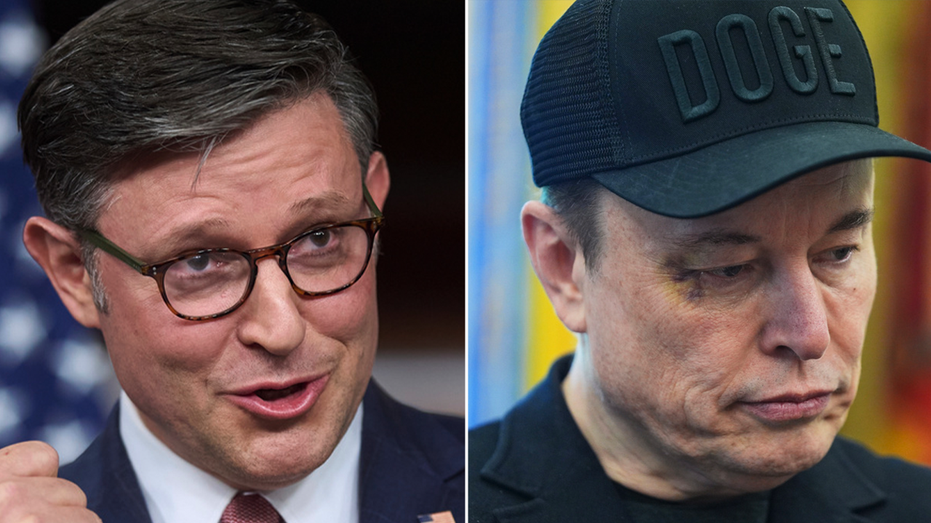Republican Lawmakers Resist Musk's 'Kill the Bill' Campaign to Undermine Trump's Policy Agenda
House Speaker Mike Johnson seeks to mend ties with Elon Musk amid GOP turmoil over the Big, Beautiful Bill.

The high-stakes drama on Capitol Hill this week centered around the so-called Big, Beautiful Bill, which has evolved into a political headache for Congressional Republicans amid an escalating feud between President Donald Trump and tech mogul Elon Musk. What began as internal party debate over fiscal responsibility quickly spiraled into a public spectacle, threatening to upend the party’s legislative agenda.
Tensions flared after Elon Musk denounced the bill, describing it as a "disgusting abomination," and sharply criticized all 215 House Republicans who voted in favor last month. Taking his grievances to his social platform X, Musk posted a now-viral meme of Uma Thurman from "Kill Bill" with the caption, "KILL the Bill," urging his millions of followers to pressure lawmakers against the legislation. This digital broadside rattled the GOP, with party leaders seeking to contain the fallout. Speaker Mike Johnson acknowledged reaching out to Musk—albeit unsuccessfully—in hopes of tempering the tech billionaire’s criticism.
Rank-and-file Republicans expressed frustration over Musk’s influence. House Budget Committee Chairman Jodey Arrington admitted, "He's got a big voice. He's got a big audience. And more importantly, it's a credible voice. But he's wrong on this issue." Nevertheless, with the legislative calendar packed, party leaders stood firm: “Elon, look, we don’t have time for a brand new bill,” Johnson said, emphasizing that returning to the drawing board was not an option.
The discord drew sharp lines even among fiscal conservatives. Representatives Warren Davidson and Thomas Massie—two Republicans who opposed the bill—pointed to deficit concerns and questioned trust in party leadership. Massie remarked that Musk had learned the hard way about congressional dealmaking and voiced support for Musk’s frustration, noting, "Trust was misplaced. And so I think he has a right to be upset with our leadership."
The drama also provided a rare opening for Democrats. While many have frequently clashed with Musk, some welcomed his opposition as a possible way to stall the bill’s progress. "He’s not my cup of tea, to put it mildly. But Republicans are already listening to him," commented Senate Minority Leader Chuck Schumer. Still, questions emerged about the consistency of Democrats’ stance toward the Tesla and SpaceX CEO, with Senator John Fetterman highlighting the party’s complicated relationship with Musk.
Adding another layer to the controversy, the White House submitted a $9.4 billion "rescissions" package, seeking to claw back already-allocated spending, mostly targeting foreign aid and public broadcasting. Critics on both sides debated the impact, with some Republicans dismissing the amount as negligible against a swelling federal deficit and Democrats lamenting the prospect of cuts to public programming.
At the heart of the dispute were conflicting projections on the bill's fiscal impact. The Congressional Budget Office (CBO) estimated the bill would add $2.3 trillion to the deficit over a decade, while supporters argued that coupled with Trump’s proposed tariffs, the legislation could ultimately decrease deficits. "I think their assumptions are wrong. We have long complained about it," Johnson insisted, reflecting ongoing GOP skepticism toward the CBO’s methodology—even as his party controls Congress.
The dispute reached fever pitch on Thursday when Musk claimed his $280 million support in the 2024 election saved the Trump presidency and helped Republicans hold onto Congress. While some GOP senators like Rand Paul and Ron Johnson welcomed Musk’s involvement, Democrats dismissed his latest interventions as "crocodile tears." Others suggested that the political alliance between Trump and Musk was always bound to deteriorate, with one senator calling the split "predictable, if not inevitable."
Despite the noise, some Republicans remained unfazed by Musk’s firestorm. "President Trump has the biggest platform on Earth," asserted Senator Bernie Moreno, pointing to Trump’s unmatched ability to rally conservatives. Yet, the uncertainty created by Musk’s intervention has left the fate of the Big, Beautiful Bill in doubt, especially given the razor-thin margins in both chambers of Congress. As Speaker Johnson conceded, "It's not helpful, but I don't think it's changed the trajectory in any way." For now, Republicans face a difficult choice, summed up by Representative Tim Burchett: "They have a choice of going against Trump or Musk."




